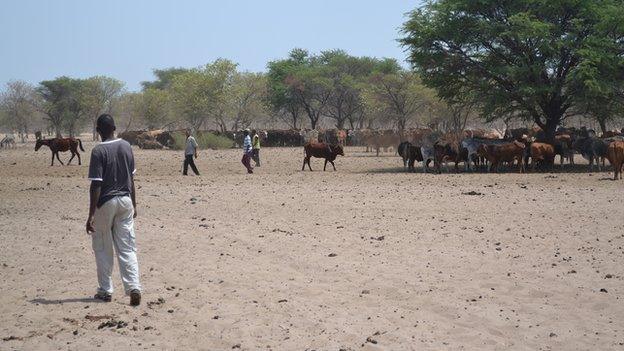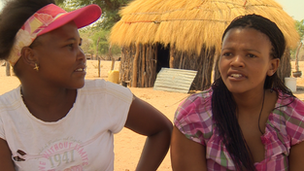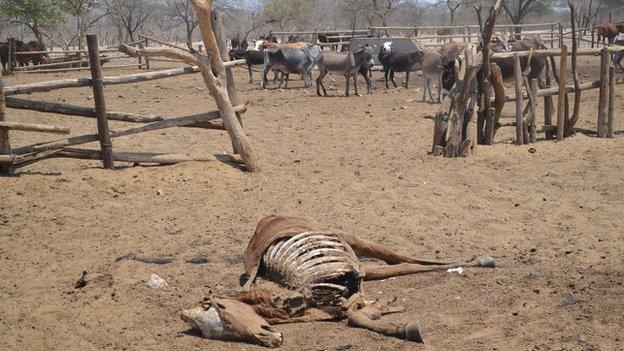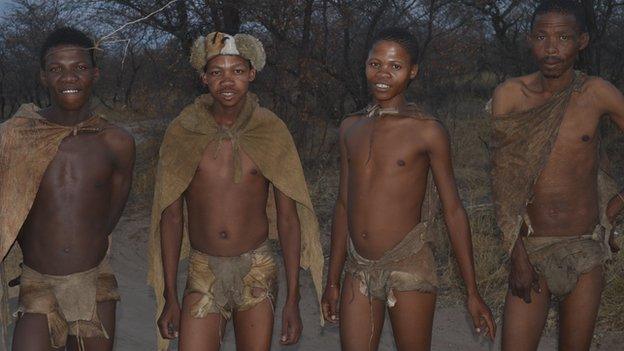Botswana Bushmen: Modern life is destroying us
- Published

When the Bushmen were relocated they were given cattle or goats to encourage them to become herders
The Kalahari sun is merciless: Two young women and two children little more than a year old are huddled under the only tree in the yard to escape the baking heat.
We are in New Xade, a resettlement camp an hour's drive from the nearest town, Ghanzi, in western Botswana.
It is the new home of the Basarwa - Kalahari Bushmen, southern Africa's first inhabitants and yet they do not take much pleasure in this honour.
Sisters Boitumelo Lobelo, 25, and Goiotseone Lobelo, 21, are kneeling in front of a basin of dirty water, washing their children's clothes.
Their eyes fill with anger when they speak of their life here, a desolate village half a day's drive from their original home, which is now part of the Central Kalahari Game Reserve (CKGR).

Boitumelo (L) and Goiotseone Lobelo (R) do not enjoy their new lives
"I miss my home and the way we lived. Life was easy, there were lots of fruits, animals and there were no bars and no beer. Now we are lost," says Goiotseone.
They have been to visit a number of times since they were evicted but are not allowed to stay there any more.
When they were aged nine and five respectively, Boitumelo and Goiotseone were moved to New Xade with their parents.
They speak fondly of life in the reserve, where they would wake up every morning and join the women in the village in collecting berries, nuts and roots to eat.
But Goiotseone also remembers the day they were forced to leave.
"The police came, destroyed our homes and dumped us in the back of trucks with our belongings and brought us here. They dumped us here like we are nothing," she tells the BBC.
These two are the new generation of Basarwa: they go to school and have learned English and the Tswana language, the most widely spoken in the country.
But they say this new life has come at too high a price.
"We are getting Aids and other diseases we didn't know about; young people are drinking alcohol; young girls are having babies. Everything is wrong here," Boitumelo says.
Thousands of Bushmen lived in the vast expanse of the Kalahari Desert for many millennia.
But today most have been moved, many argue forcibly, to government-built resettlement camps far from the reserve.
There are an estimated 100,000 Bushmen across southern Africa, mainly in Botswana, Namibia, South Africa and Zambia.
While some people find the term Bushmen offensive, this is what this group of people prefer to be called.
Battle lines
The Botswana Bushmen have been at odds with the country's government for more than 15 years, embroiled in several legal battles over their right to live inside the game park - and to continue their traditional lifestyle as hunter-gatherers.
At some point they were denied access to water in the reserve. Their boreholes were capped and they were banned from drilling more.
The Botswana Appeals Court, in a 2011 judgment on the matter, described the plight of the Bushmen as a "harrowing story of human suffering and despair" and ruled that they be allowed access to water.
Today many say court orders in their favour have been ignored by officials. They need permits to enter the reserve and are not allowed to hunt. Those found hunting face arrest.
But why were they relocated?

The government says the restriction of people on the land is intended to preserve the wildlife and the ecosystems of the vast reserve, which is slightly bigger than Denmark.
But human rights groups and the Bushmen believe the real reason is more sinister.
Mining is one of Botswana's key industries, with diamond mining the leading source of revenue.
The ancestral lands of the Bushmen lie in the middle of the world's richest diamond field. They believe they were relocated to make way for a multimillion dollar mining project.
A London-listed diamond producer has begun plans for production about 45km (28 miles) from the eastern border of the reserve.
Construction of the first phase of the project began in 2011, with the first output expected later this year.
The government has always denied that there is a link between the relocations and the diamond deposits, first discovered in the 1980s.
The state has provided some amenities in the resettlement camps: There are clinics, schools and concrete houses in fenced-up yards - all part of a plan to modernise this community.
But modern life does not work for everyone: The Basarwa have built huts in their yards, as a reminder of happier times and their traditional lives.
Changing lifestyles

The Bushmen have always been hunters and say they have never learned the skills needed to breed cattle
Unemployment is high and this community has no expertise to speak of, or at least none that they can use in the outside world.
The village's liquor shop has no shortage of customers. It is not uncommon to see young men stumbling out of local watering holes in the mid-afternoon.
It is not just living and social conditions that are proving problematic.
Hundreds of cows and their herders are resting under thorn trees preparing for a 5km-walk (three miles) to the nearest grazing patch.
When the Bushmen were relocated, each family was given five cattle or goats to encourage them to become farmers.
But being pastoralists has had its challenges.
"If you push somebody to a certain kind of lifestyle that he doesn't know, he will be facing a lot of difficulties," says one bushman farmer, Jumanda Galekebone.
"Our people don't know how to look after the cows when they get sick, they don't know about diseases of cattle like foot and mouth disease," he explains.
His peers agree, so there under the thorn trees, surrounded by cattle who could do with some fattening up, they tell me that they want to go home.
They say modern life has not worked for them.
"This life hasn't improved any of their lives. We still get a lot of people going inside the park to hunt and they get arrested. Some of us here are facing court penalties for hunting. It just proves that you can't force change on people," says Mr Galekebone.
But it appears that the Bushmen have no choice but to change, to adapt - at least as far as the latest government plans reveal.
Out of touch?
Some believe that the Bushmen's way of life does not belong in modern Botswana society.
Some officials have referred to them as "remote area dwellers", a "Stone-Age" people who should be pulled into the 21st Century.

Some fear that traditional Bushman culture would be reserved for tourists
In 2006, another court ruled that the government's refusal to allow the Basarwa into the CKGR was unconstitutional.
A handful have been allowed by officials to return to the park but only those whose names appeared in the court papers.
Roy Sesana, a community leader, is one of them.
But he says he does not enjoy the victory. He now lives between CKGR and New Xade to be close to his family and his people, he tells me.
"We have been separated from our children and our wives. What kind of life is this? We didn't do anything to deserve this," he says.
Mr Sesana was one of the main applicants in a number of cases against the government.
For a people who have spent most of their lives roaming the land freely, hunting wild animals and gathering berries and nuts for food, this place offers them no chance to live off the land.
"We are used to feeding ourselves - now dependant on government hand-outs, we are being made lazy and stupid," says Mr Sesana.
"Now we are being treated like dogs. The dog is the only thing that can't bring its own food home. It has to wait for its owner to give it some food."
International human rights groups are calling for a boycott of Botswana's tourism industry, its second largest revenue generator until the government "stops persecuting the country's first inhabitants".
President Ian Khama, who is seen as more subtle when it comes to managing the Bushmen situation, has announced that hunting in controlled areas would be outlawed by January 2014.
"The decision was necessitated by available scientific based information indicating that several wildlife species are in decline," Mr Khama told parliament.
He said the Bushmen would be taught "non-consumptive" ways of using their resources.
But the Bushmen argue that their years of living in harmony with the environment prove that their ways are ecologically sustainable.
They say instead that this move is an attempt to do away with their culture.
"The only place where you find Bushmen now in our traditional clothes surrounded by traditional huts is in the local tourism villages," says Mr Sesana.
"We are worried that in the future, there will be no-one who would be able to practice the Bushman culture unless they are parading in front of tourist for companies who are using them for business," he says.
- Published27 January 2011
- Published3 November 2010
- Published9 August 2013

- Published4 May 2015